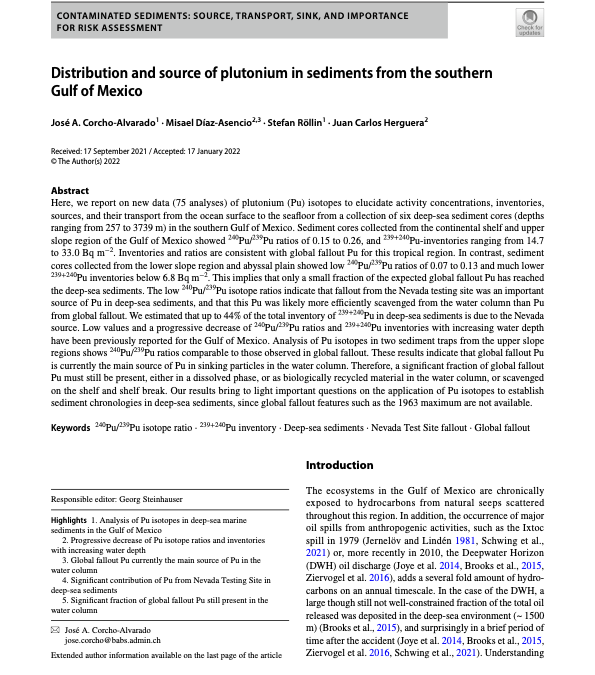Authors: José A. Corcho-Alvarado, Misael Díaz-Asencio, Stefan Röllin & Juan Carlos Herguera
https://doi.org/10.1007/s11356-022-18770-6
Abstract
Here, we report on new data (75 analyses) of plutonium (Pu) isotopes to elucidate activity concentrations, inventories, sources, and their transport from the ocean surface to the seafloor from a collection of six deep-sea sediment cores (depths ranging from 257 to 3739 m) in the southern Gulf of Mexico. Sediment cores collected from the continental shelf and upper slope region of the Gulf of Mexico showed 240Pu/239Pu ratios of 0.15 to 0.26, and 239+240Pu-inventories ranging from 14.7 to 33.0 Bq m−2. Inventories and ratios are consistent with global fallout Pu for this tropical region. In contrast, sediment cores collected from the lower slope region and abyssal plain showed low 240Pu/239Pu ratios of 0.07 to 0.13 and much lower 239+240Pu inventories below 6.8 Bq m−2. This implies that only a small fraction of the expected global fallout Pu has reached the deep-sea sediments. The low 240Pu/239Pu isotope ratios indicate that fallout from the Nevada testing site was an important source of Pu in deep-sea sediments, and that this Pu was likely more efficiently scavenged from the water column than Pu from global fallout. We estimated that up to 44% of the total inventory of 239+240Pu in deep-sea sediments is due to the Nevada source. Low values and a progressive decrease of 240Pu/239Pu ratios and 239+240Pu inventories with increasing water depth have been previously reported for the Gulf of Mexico. Analysis of Pu isotopes in two sediment traps from the upper slope regions shows 240Pu/239Pu ratios comparable to those observed in global fallout. These results indicate that global fallout Pu is currently the main source of Pu in sinking particles in the water column. Therefore, a significant fraction of global fallout Pu must still be present, either in a dissolved phase, or as biologically recycled material in the water column, or scavenged on the shelf and shelf break. Our results bring to light important questions on the application of Pu isotopes to establish sediment chronologies in deep-sea sediments, since global fallout features such as the 1963 maximum are not available.
Keywords: 240Pu/239Pu isotope ratio, 239+240Pu inventory, Deep-sea sediments, Nevada Test Site fallout, Global fallout


Recent Comments